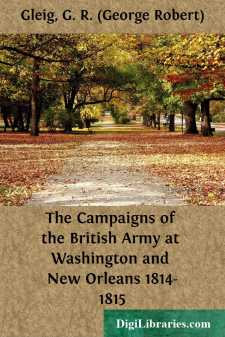Categories
- Antiques & Collectibles 13
- Architecture 36
- Art 48
- Bibles 22
- Biography & Autobiography 813
- Body, Mind & Spirit 142
- Business & Economics 28
- Children's Books 12
- Children's Fiction 9
- Computers 4
- Cooking 94
- Crafts & Hobbies 4
- Drama 346
- Education 46
- Family & Relationships 57
- Fiction 11828
- Games 19
- Gardening 17
- Health & Fitness 34
- History 1377
- House & Home 1
- Humor 147
- Juvenile Fiction 1873
- Juvenile Nonfiction 202
- Language Arts & Disciplines 88
- Law 16
- Literary Collections 686
- Literary Criticism 179
- Mathematics 13
- Medical 41
- Music 40
- Nature 179
- Non-Classifiable 1768
- Performing Arts 7
- Periodicals 1453
- Philosophy 64
- Photography 2
- Poetry 896
- Political Science 203
- Psychology 42
- Reference 154
- Religion 513
- Science 126
- Self-Help 84
- Social Science 81
- Sports & Recreation 34
- Study Aids 3
- Technology & Engineering 59
- Transportation 23
- Travel 463
- True Crime 29
The Campaigns of the British Army at Washington and New Orleans 1814-1815
Categories:
Description:
Excerpt
CHAPTER I.
A REVOLUTION must occur in the condition and sentiments of mankind more decided than we have any reason to expect that the lapse of ages will produce, before the mighty events which distinguished the spring of 1814 shall be spoken of in other terms than those of unqualified admiration. It was then that Europe, which during so many years had groaned beneath the miseries of war, found herself at once, and to her remotest recesses, blessed with the prospect of a sure and permanent peace. Princes, who had dwelt in exile till the very hope of restoration to power began to depart from them, beheld themselves unexpectedly replaced on the thrones of their ancestors; dynasties, which the will of one man had erected, disappeared with the same abruptness with which they had arisen; and the influence of changes which a quarter of a century of rapine and conquest had produced in the arrangements of general society, ceased, as if by magic, to be felt, or at least to be acknowledged. It seemed, indeed, as if all which had been passing during the last twenty or thirty years, had passed not in reality, but in a dream; so perfectly unlooked for were the issues of a struggle, to which, whatever light we may regard it, the history of the whole world presents no parallel.
At the period above alluded to, it was the writer's fortune to form one of a body of persons in whom the unexpected cessation of hostilities may be supposed to have excited sensations more powerful and more mixed than those to which the common occurrences of life are accustomed to give birth. He was then attached to that portion of the Peninsular army to which the siege of Bayonne had been intrusted; and on the 28th of April beheld, in common with his comrades, the tri-coloured flag, which, for upwards of two months, had waved defiance from the battlements, give place to the ancient drapeau blanc of the Bourbons. That such a spectacle could be regarded by any British soldier without stirring up in him strong feelings of national pride and exultation, is not to be imagined. I believe, indeed, that there was not a man in our ranks, however humble his station, to whose bosom these feelings were a stranger. But the excitation of the moment having passed away, other and no less powerful feelings succeeded; and they were painful, or the reverse, according as they ran in one or other of the channels into which the situations and prospects of individuals not unnaturally guided them. By such as had been long absent from their homes, the idea of enjoying once more the society of friends and relatives, was hailed with a degree of delight too engrossing to afford room for the occurrence of any other anticipations; to those who had either no homes to look to, or had quitted them only a short time ago, the thoughts of revisiting England came mixed with other thoughts, little gratifying, because at variance with all their dreams of advancement and renown. For my own part I candidly confess, that though I had just cause to look forward to a return to the bosom of my family with as much satisfaction as most men, the restoration of peace excited in me sensations of a very equivocal nature....



